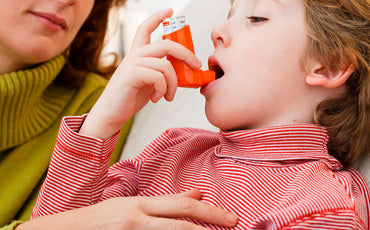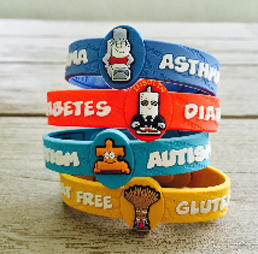
After the epinephrine: 7 things to expect at the hospital
So I’ve had the displeasure of racing my sweet-natured, allergy-asthma kid, Ben, to the ER on about half a dozen occasions. Not TOO bad, considering he’s 11, right?
We’ve gone twice for allergy-related crises; twice for asthma-related emergencies; once for tripping and cracking his head on a glass table; and another time when he accidentally stabbed himself in the palm of his hand with an EpiPen®. The fun never ends! ; )
Even though our allergy and asthma scares take the lead in our ER trip count, I’m certainly no expert (thank God) in ER protocol. However, I do want to share my experiences with my fellow allergy and asthma moms in hopes of passing on some helpful info about what to expect, especially to those of you who may not yet have known the sheer and utter joy of racing your child to the ER. I believe the more we know, the better prepared we are, making the experience less traumatizing (or so I tell myself).
With that said, here are seven things many of us can expect when visiting the ER:
1. Expect to see the opposite of what’s on TV.
For whatever reason, my ER room visits have always been at night and, for the most part, the experience has been nothing like the TV shows and movies. There were no ambulances pulling up, freaking us out with their piercing sirens, and there were no EMT personnel racing stretchers of bullet-wound patients through the sliding doors. As a matter of fact, the entry and waiting areas are usually pretty dull and uneventful, so if anyone is screaming, it will likely be you. (Oh, and please don’t expect to see anyone who looks like McDreamy or George Clooney anywhere on the hospital grounds.)
2. Expect your allergy kid to be treated like a VIP.
Allergy emergencies get admitted immediately. Though it may seem like a no brainer for a really sick or injured kid to be cared for upon arrival, I sat in the waiting room for what seemed like an eternity before my then 18-month-old Ben was admitted for his glass-cracked head. What I’m saying is pain is not too much of a consideration when hospital personnel choose who waits and who doesn’t. But if you show up and say, “My child is having a severe allergic reaction,” they know it’s a time-sensitive issue and will slap a wristband on him or her and let you right in. So while I don’t obviously recommend this situation, there’s the silver lining. ; )
3. Expect to be needed.
Unless the situation calls for it, your child will not be whisked away. Instead, a nurse will start monitoring your child’s vitals, and you will be expected to provide all sorts of basic info like his or her weight and other stats. The nurse will quickly get around to allergen-related questions – What was your child exposed to? Did you give your child medication for the exposure? If so, what (i.e. Benadryl and/or epinephrine) and how much? What time did you last give them the medication? Keep a clear head and note this info so that you can ensure your child gets the best care possible.
4. Expect more meds to be given. And then more meds.
There is a chance that your child may require another shot of epinephrine. Don’t panic; this is totally normal. Your child may feel a bit shaky as a result, but reassure them that this is okay. It’s also very likely that your child will be given a steroid (which will help prevent a rebound reaction), and if you didn’t given them Benadryl before your arrival, they may give your child that, too. (In my experiences, our local medical personnel have not messed around. They’ve given Ben all three medicines: Benadryl, epinephrine and steroids.)
They may also give your child a Zantac®, which is actually an antihistamine even though it’s primarily used as a heartburn medication. (Don’t confuse it with Xanax, like me on our last visit, when I misinterpreted the nurse, thinking she was giving ME a Xanax for my ridiculous level of anxiety!)
5. Expect to do a lot of waiting around.
Once the allergic symptoms subside and you have breathed a huge sigh of relief, don’t expect to leave. Instead, expect to do a lot of hanging out. This is only because physicians like patients to remain in the hospital two to three hours after their symptoms are gone to make sure there is no relapse. While I was drained and certainly ready to be in my bed, I can’t say that I minded!
6. Expect to be very emotional.
There is nothing worse than watching your child have a severe reaction. I’m not a big “crier” but, every time something of this sort has happened, I’m fighting back tears almost instantly. However, it’s very important to remain calm for your kid’s sake, so take a deep breathe and think about how much they need you. They’re terrified, and if they see you freaking out, this will scare them even more. Once the fear has subsided with the symptoms, expect your mood to shift to anger – anger at yourself while you replay every moment leading up to the allergen exposure. Why wasn’t I there? or Why wasn’t I paying more attention? or Why didn’t I double check?
7. Expect there to be paperwork.
Yep, there is no escaping it. Even in our worst moments, hospitals are going to expect you to fill out and sign ALL. THOSE. FORMS. After things calm down, while you wait, you may receive some information and perhaps a prescription for a steroid. (Some physicians will ask you to continue to give steroids or even Benadryl after the visit.) And the reigning enemy of all paperwork… yes, expect to get a big ‘ole bill. (Rest assured, someone will come by and collect your credit card. The icing on the cake!)
I know everyone’s situation is different, but the above seven things have been par for the course for my family. So while I hope it helps you if you need it, my greater hope is that you never have to find out. : )
xo – Iris
P.S. Want to hear more of my experiences as an allergy and asthma mom? Sign up for our newsletter and I’ll let you in.






